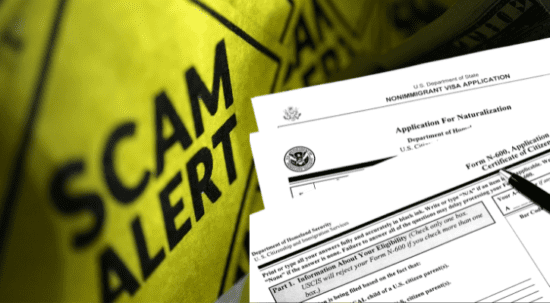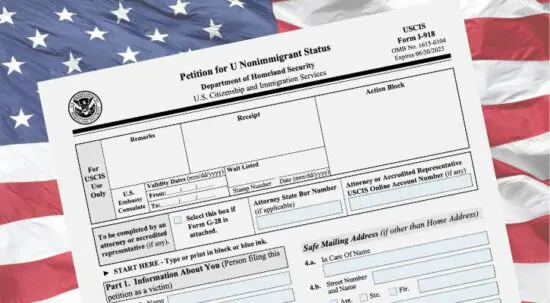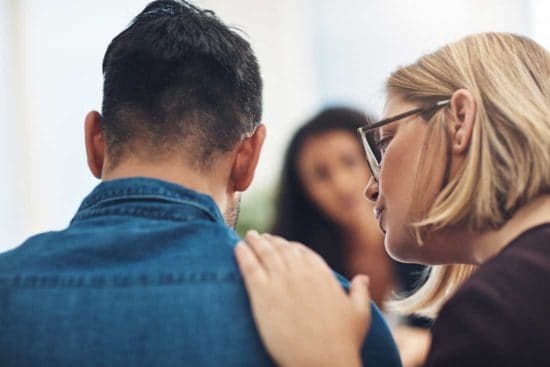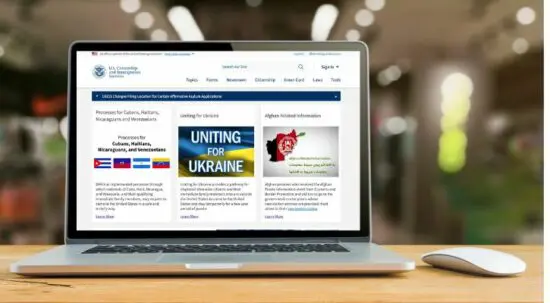What is VAWA?
The Violence Against Women Act (VAWA) immigration program is for immigrants abused by a family member who is a U.S. citizen or lawful permanent resident (LPR). Abuse and domestic violence are actions meant to hurt and control someone in a close relationship.
Sometimes people stay in dangerous situations because their immigration status is dependent on a family member. VAWA is called a “self-petition” because it provides you a way to adjust your status without your abuser’s help or cooperation to file a petition for immigrant status for you.
If your VAWA is approved, you will be granted deferred action and become eligible to apply to be a lawful permanent resident with a Green Card. Deferred action means you can live and work in the USA.
If your VAWA petition is approved, you can:
- Live and work in the U.S. legally
- Apply for a Green Card
- Receive public benefits (if you are the spouse or child of an abuser)
VAWA is still available under the current U.S. government. You can apply for VAWA and continue to receive VAWA benefits. If you have questions, talk to an immigration lawyer.
Who can apply?
Both men and women can apply for VAWA. You do not have to have legal immigration status. It is for survivors of domestic abuse.
You can apply for a VAWA self-petition if:
- You were abused by your parent, spouse, former spouse, or adult child.
- Your abusive relative is a U.S. citizen or lawful permanent resident.
- You must have lived with your abusive relative during your relationship.
- You have good moral character.
You must prove the abuse you experienced was battery or extreme cruelty to qualify for VAWA. This includes:
- Threats of violence
- Physical abuse & emotional abuse
- Rape & sexual abuse
- Financial control
- Forceful detention
- Forced prostitution & labor
If you currently live outside the USA, you must also show that you were abused in the United States or your abusive relative works for the U.S. government or armed forces.
How do I apply?
You apply for VAWA through U.S. Citizenship and Immigration Services (USCIS). It does not cost anything to apply. You will need to:
- Complete Form I-360.
- Provide evidence that you have a qualifying relationship with the abuser.
- Provide evidence of the abuser’s U.S. citizenship or legal permanent residence status.
- Provide evidence that you were severely abused.
- Include a personal statement about your experience.
- Provide evidence of good moral character.
You will mail your forms to the USCIS Nebraska Service Center. If you do not feel safe getting mail at your home, you can get a safe address to use on applications.
You may be able to file for a Green Card at the same time you file for VAWA if your abuser is a U.S. citizen. See more information below.

It is important to get legal advice. A lawyer or accredited representative can help you find out if you qualify and complete your application.
If you are filing as an abused spouse or child, you can add your child to your self-petition. Your child must be under 21 years old and unmarried. You cannot include family members on your self-petition if you are filing as an abused parent.
When you apply, you will need to collect evidence to show that you meet the visa requirements. Here are some examples of documents you can show for each.
Evidence of your abuser’s status:
- Birth certificate
- Citizenship certificate
- Green Card
- U.S. passport
If unavailable, you can also ask USCIS to search its database for evidence of your abuser’s status.
Evidence of your relationship:
- Marriage certificate
- Divorce decree
- Birth certificate (if your abuser is your adult child)
- Affidavits and photos of the wedding ceremony
Evidence that you have lived together:
- Lease, mortgage, rental agreement
- Utility bill
- Bank statement
- School records
- Medical records
- Insurance policy
- Income tax filings
Evidence of abuse can be a report or affidavit from:
- Police
- Judge or court official
- Medical personnel
- School official
- Social worker
- Social service agency personnel
- Family or friends who witnessed the abuse
Evidence of your “good moral character” if you are over 14:
- Police clearance from any city you have lived for longer than 6 months during the last 3 years or more
- State-issued criminal background check
Evidence of a “good faith” marriage if you are petitioning as a spouse:
- Insurance listing the other spouse
- Joint property leases
- Income tax forms
- Bank statements
- Evidence of courtship
- Wedding ceremony documentation
- Statements or affidavits from witnesses
Other documentation of abuse, such as photographs and text messages, can be helpful, as well as letters from people who know your situation.
Your application will also include a personal statement, also called an affidavit. This is your chance to tell your story and explain what happened in your own words. Include information in your statement that shows how you meet the requirements. If you are missing other documentation, you can explain why in your statement.
USCIS will review your applications more closely and may ask for more evidence for applications that are pending or filed on or after December 22, 2025.
A U visa is for immigrants who survived a serious crime, including domestic violence. It offers a temporary status for 4 years and the possibility to apply for a Green Card. It does not require you to have a qualifying relative like VAWA does.
Some other differences include:
- There is a limit to how many U visas are given in a year, while there is no limit for VAWA.
- U visa applications have a long wait time. You can get a green card faster with VAWA.
- For a U visa, you must be willing to help law enforcement investigate or prosecute the crime. This is not required for VAWA.
Some people may apply for both VAWA and U Visa.
If you are in immigration court proceedings, you may be eligible to request deferred action through VAWA cancellation of removal. This process has a few different requirements, and you will want to get legal help to see if you qualify. If your application is approved, the removal process will end.
After you file your application, you will receive a receipt notice. This notice will have information you will need to be able to check the status of your case.
USCIS will review your application and may ask for more information. You may be scheduled for a biometrics appointment to provide a photograph, fingerprints, and your signature.
If USCIS finds that you have submitted everything correctly, they may issue a Notice of Prima Facie Case. This is not an approval, and you may have to file more evidence later. You can use this document to apply for some public benefits while your case is pending. NPFCs are usually valid for 1 year and can be renewed.
You will get a decision in the mail.
If you file for a Green Card at the same time as your VAWA petition, you will have an interview at a local USCIS field office after your Form I-360 is approved. The interview will be about your Green Card application, but you will not need to talk about the abuse.
Currently, the average processing time for VAWA cases is 45 months.
Each case is different, and some may take more or less time to complete. You can track the status of your case online or send questions to the USCIS Nebraska Service Center.
If your VAWA petition is denied, you will have the same immigration status you had when you applied. You can file an appeal with the Nebraska Service Center using Form I-290B. Your notice will explain your options and a deadline to respond.
You might also qualify for other forms of protection, including temporary protected status, U Visa, T Visa, or other humanitarian programs. Contact an immigration attorney or accredited representative to review your options.
It is very important to talk to a legal representative to find out if you can safely travel abroad. If you leave the country while your VAWA application is pending, you may not be allowed to return. Leaving the country could also put your case at risk.
Once you have an approved VAWA petition, you can apply for advance parole to travel outside of the USA. It is important to know that any time you leave the country with a temporary visa, you risk being denied reentry. Travel outside of the USA may also create problems for your Green Card application.
A legal representative can provide more guidance with these U.S. immigration laws.
You may still face immigration enforcement even if you have applied for or been approved for VAWA.
- Always carry your immigration documents and proof of two years of residence. Make sure you have copies of your receipt, bona fide determination, approval notices, and work permit with you.
- Save the contact information for the advocate and lawyer involved in your case.
- Be prepared for ICE. Learn what to do if immigration officers stop you. Know your rights and how to create a safety plan.
Ruqsadda shaqo
A work permit is also called an Employment Authorization Document (EAD). An EAD shows employers that you are allowed to work in the USA.
You will automatically get your EAD card when your Form I-360 is approved if you check “Yes” on Part 10, Question 12. You do not need to file a separate application.
If you did not request an EAD on your Form I-360, you and your derivative children can file Form I-765 after your form is approved.
If you are eligible to file a Form I-485 at the same time as your Form I-360 (see section below), you may also file a Form I-765. Your Form I-765 will be adjudicated separately from your Form I-360. You will get your EAD card upon approval.
Green Card
To apply for a Green Card, you will need to file Form I-485. Learn about the requirements and process for VAWA. There are fees to file for a Green Card. If you can not afford the fees, you can ask for a fee waiver.
The options to file are different based on your abuser’s immigration status:
If your abuser is a U.S. citizen, you can apply for a Green Card when you are applying for VAWA or wait until your VAWA is approved. If you apply at the same time as VAWA, your Green Card will be processed after your petition is approved. A legal representative can help you make the best decision on when to apply.
If your abuser is a lawful permanent resident, you must wait for your VAWA to be approved and for a visa to be available. Depending on what your relationship is with your family member, you may need to wait several years.
You can add your child to your Green Card application as a derivative applicant. Your child does not have to file a new petition.
If approved for a Green Card, you may be eligible to apply for citizenship after 5 years (or 3 years if your abuser is a U.S. citizen). You can also apply for certain family members to join you in the USA.
Public benefits
Public benefits are programs that help with basic needs. You may be eligible for certain federal and state public benefits if you filed as an abused spouse or child and if you have either:
- A Notice of Prima Facie Case (NPFC). This is given to those who are considered eligible for Form I-360 upon first review.
- A notice of an approved Form I-360.
You may not be eligible if you have committed certain crimes.
Your safety
USCIS will keep all your information confidential. They will not share your information without your permission, except in rare cases.
These confidentiality protections end if and when you become a U.S. citizen.
Many undocumented immigrants worry that if they report a crime, they may be deported. The VAWA program is there to help people who are victims of crimes and make it safer to report them. You are not required to have legal immigration status to apply for VAWA.
In most cases, USCIS cannot use information from an abuser or share your case details. However, if USCIS finds certain serious criminal convictions, or if it is not deciding eligibility for admission or deportation, these protections may not apply. A lawyer can help you understand how this could affect your case.
Find help and support
Legal Help
This process is complex. You are strongly encouraged to get legal help. An immigration lawyer or accredited representative can help you find out what you qualify for and help you complete your application and prepare your evidence. This will increase your chances of approval and help make sure you do not put your status at risk.
Find free or low-cost legal help.
Domestic violence help
Call the National Domestic Violence Hotline at 800-799-7233 or text START to 88788. You can speak to a person 24 hours a day, 7 days a week. Interpreters are available in over 140 languages.
Your abuser may check where you go on the internet. Be sure to regularly clear your browser history or use a safe device like a friend’s phone or public library computer. Learn more about getting help for domestic violence.
Call 911 if you are ever in immediate danger.
Emotional support
Survivors of abuse may experience trauma, leading to sadness or depression. Getting mental health support can help you feel better. Learn more about trauma and where to find help.
Warar dheeraad ah oo ka socda USAHello
Ma waad raadineysaa macluumaad gaar ah?
Macluumaadka ku jira boggan wuxuu ka imanayaa USCIS, WomensLaw.org, iyo ilo kale oo lagu kalsoon yahay. Waxaan hiigsaneynaa inaan bixino macluumaad si fudud loo fahmi karo oo si joogto ah loo cusboonaysiiyo. Macluumaadkani maaha talo sharci.




